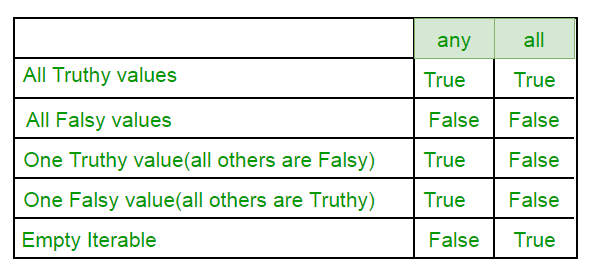---
title: Python Any Iterable
---
`any()` is a built-in function in Python 3 (and Python 2 since version 2.5), to check if any of the items of an _iterable_ is `True`. It takes one argument, `iterable`. This table below is helpful in understanding `all` and `any` iterable.
 ## Argument
### iterable
The `iterable` argument is the collection whose entries are to be checked. It can typically be a `list`, `str`, `dict`, `tuple` etc., even a `file object`.
## Return Value
The return value is a Boolean. It returns 'False' if and only if **all** entries of iterable are `False`, or the `iterable` is empty. This function essentially performs a Boolean `OR` operation over all elements.
If even one of them is `True`, it returns `True`.
The `any()` operation is equivalent to (internally, may not be implemented exactly like this)
def any(iterable):
for element in iterable:
if element:
return True
return False
It stops the execution as soon as the result is known.
## Code Sample
print(any([])) #=> False
print(any({})) #=> False
print(any([None])) #=> False
print(any(['', {}, 0])) #=> False
print(any([6, 7])) #=> True
print(any([6, 7, None])) #=> True
print(any([0, 6, 7])) #=> True
print(any([9, 8, [1, 2]])) #=> True
print(any([None, []])) #=> False
print(any([9, False, [1, 2]])) #=> True
🚀 Run Code
Official Docs
### Sources
1. Any & All in Python, Accessed: October 22, 2018
2. Image, Accessed: October 22, 2018
## Argument
### iterable
The `iterable` argument is the collection whose entries are to be checked. It can typically be a `list`, `str`, `dict`, `tuple` etc., even a `file object`.
## Return Value
The return value is a Boolean. It returns 'False' if and only if **all** entries of iterable are `False`, or the `iterable` is empty. This function essentially performs a Boolean `OR` operation over all elements.
If even one of them is `True`, it returns `True`.
The `any()` operation is equivalent to (internally, may not be implemented exactly like this)
def any(iterable):
for element in iterable:
if element:
return True
return False
It stops the execution as soon as the result is known.
## Code Sample
print(any([])) #=> False
print(any({})) #=> False
print(any([None])) #=> False
print(any(['', {}, 0])) #=> False
print(any([6, 7])) #=> True
print(any([6, 7, None])) #=> True
print(any([0, 6, 7])) #=> True
print(any([9, 8, [1, 2]])) #=> True
print(any([None, []])) #=> False
print(any([9, False, [1, 2]])) #=> True
🚀 Run Code
Official Docs
### Sources
1. Any & All in Python, Accessed: October 22, 2018
2. Image, Accessed: October 22, 2018
 ## Argument
### iterable
The `iterable` argument is the collection whose entries are to be checked. It can typically be a `list`, `str`, `dict`, `tuple` etc., even a `file object`.
## Return Value
The return value is a Boolean. It returns 'False' if and only if **all** entries of iterable are `False`, or the `iterable` is empty. This function essentially performs a Boolean `OR` operation over all elements.
If even one of them is `True`, it returns `True`.
The `any()` operation is equivalent to (internally, may not be implemented exactly like this)
def any(iterable):
for element in iterable:
if element:
return True
return False
It stops the execution as soon as the result is known.
## Code Sample
print(any([])) #=> False
print(any({})) #=> False
print(any([None])) #=> False
print(any(['', {}, 0])) #=> False
print(any([6, 7])) #=> True
print(any([6, 7, None])) #=> True
print(any([0, 6, 7])) #=> True
print(any([9, 8, [1, 2]])) #=> True
print(any([None, []])) #=> False
print(any([9, False, [1, 2]])) #=> True
🚀 Run Code
Official Docs
### Sources
1. Any & All in Python, Accessed: October 22, 2018
2. Image, Accessed: October 22, 2018
## Argument
### iterable
The `iterable` argument is the collection whose entries are to be checked. It can typically be a `list`, `str`, `dict`, `tuple` etc., even a `file object`.
## Return Value
The return value is a Boolean. It returns 'False' if and only if **all** entries of iterable are `False`, or the `iterable` is empty. This function essentially performs a Boolean `OR` operation over all elements.
If even one of them is `True`, it returns `True`.
The `any()` operation is equivalent to (internally, may not be implemented exactly like this)
def any(iterable):
for element in iterable:
if element:
return True
return False
It stops the execution as soon as the result is known.
## Code Sample
print(any([])) #=> False
print(any({})) #=> False
print(any([None])) #=> False
print(any(['', {}, 0])) #=> False
print(any([6, 7])) #=> True
print(any([6, 7, None])) #=> True
print(any([0, 6, 7])) #=> True
print(any([9, 8, [1, 2]])) #=> True
print(any([None, []])) #=> False
print(any([9, False, [1, 2]])) #=> True
🚀 Run Code
Official Docs
### Sources
1. Any & All in Python, Accessed: October 22, 2018
2. Image, Accessed: October 22, 2018